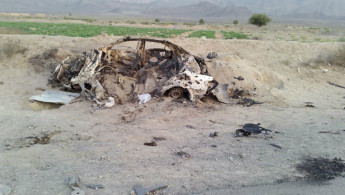Taliban chief killed by US drone was in Iran
The Taliban have not commented officially on the very rare American drone attack deep inside Pakistan on Saturday, authorised by President Barack Obama.
Mansour had just returned from Iran when his vehicle was struck, security officials told AFP.
"Mansour was being closely monitored for a while... until he was targeted along with other fighters aboard a vehicle," Afghanistan's National Directorate of Security said in a statement.
The driver, who also died in Saturday's attack, was a civilian who worked for a local rental company, according to officials, contradicting the US account that he was a "second combatant."
The deaths of Taliban leaders have often been falsely reported.
Mansour himself was rumoured to have been killed last December.
| Who will succeed Taliban leader Mullah Akhtar Mansour? |
|
- Mansour was appointed head of the Taliban in July 2015 following revelations that the group's founder Mullah Omar was dead |
Two Pakistani intelligence officials told AFP the drones struck a Toyota Corolla near the city of Quetta, killing two people whose bodies were burned beyond recognition.
A member of the Quetta Shura, the Taliban's leadership council, said that Mansour had been unreachable on his mobile phone since Saturday night.
"We are not sure if something is really wrong or he purposely switched off his phone fearing an attack," he told AFP on condition of anonymity.
Mansour was formally appointed head of the Taliban in July last year following the revelation that the group's founder Mullah Omar had been dead for two years.
"Mansour posed... an imminent threat to US personnel, Afghan civilians and Afghan security forces," US Secretary of State John Kerry said during a visit to Myanmar Sunday.
"He was also directly opposed to peace negotiations."
Fresh infighting
But Mansour's apparent death was not immediately seen as likely to push the Taliban closer to peace talks.
It could press them to show they are still able to wage an aggressive battle, observers say.
"The war has been going on for so long, the Taliban has so many leaders and so much ability to function at the local level even without strong central guidance, that we would be well advised to keep expectations in check," said Michael O'Hanlon of the Brookings Institution think-tank.
The drone attack came just days after representatives from the US, China, Pakistan and Afghanistan held another round of negotiations in Islamabad aimed at reviving long-stalled direct peace talks between the Afghan government and the Taliban.
However pressure has been building in recent months for the US to return to direct attacks on the Taliban, particularly via air strikes.
NATO ended its combat mission in Afghanistan in December 2014, pulling out the bulk of its troops, although a 13,000-strong residual force remains for training and counterterrorism operations.
The Taliban, who announced the start of their annual spring offensive last month, have already stepped up their campaign against the Western-backed Kabul government for the season.





 Follow the Middle East's top stories in English at The New Arab on Google News
Follow the Middle East's top stories in English at The New Arab on Google News


